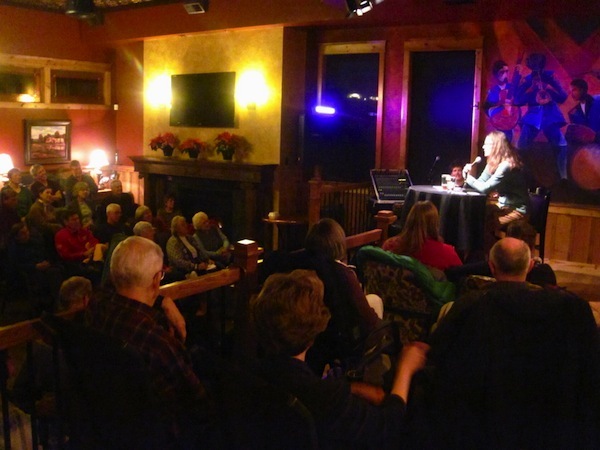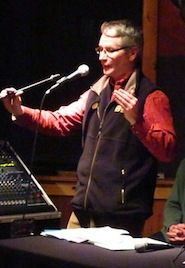Science on Tap sparks UW, Northwoods dialogue

Anna Pidgeon, an assistant professor of forest and wildlife ecology, speaks to the crowd about birds and their environment at the Minocqua Brewing Company.
University of Wisconsin–Madison researchers are highlighting the university’s impact more than 200 miles away from campus through a series of conversations involving community members on topics ranging from carnivore conservation to climate change.
Science on Tap-Minocqua, held the first Wednesday of every month at the Minocqua Brewing Company, is a collaborative effort between local UW–Madison research stations, the Lakeland Badger Chapter of the Wisconsin Alumni Association and the Minocqua Public Library that aims to create an ongoing dialogue between Northwoods residents and the university.
“We hope for a two-way dialogue between researchers at the university or elsewhere that are leading the presentation and the community,” says Tim Kratz, director of Trout Lake Station, a Center for Limnology field station located near Minocqua, Wis.
Kratz suggested the format after discovering a similar event hosted in Ashland on a trip back from Duluth, Minn. The Minocqua event allows UW–Madison researchers to showcase their research and how it affects northern Wisconsin.
Speakers give presentations of 15 minutes or less, without a PowerPoint, which is followed by a question-and-answer session that often continues for more than an hour.

Tome Steele, director of the Kemp Natural Resources Research Station, speaks at on the Science on Tap sessions.
Tom Steele, director of the College of Agricultural and Life Sciences’ Kemp Natural Resources Research Station, describes the event as a “community conversation,” depending on the participation of audience members who often share their own stories and opinions.
Public lectures at the research station usually draw as few as five people and at the most 50. The first Science on Tap event, which focused on the history of the Northwoods, drew more than 200.
“It turned into a standing-room-only event. People were on the stairs listening to what the first speaker had to say,” says Doug Etten, Minocqua Brewing Company manager and marketing director.
Between 30 and 40 people couldn’t even get inside the building, says Hank Roessel, Lakeland Badger Chapter treasurer, who played a role in creating the event. Other alumni chapters are interested in replicating the event in other parts of the state, he says.
“The people seem to really respond favorably to the fact that the university is doing things that directly can benefit or impact residents and this is one way to educate the public about that,” Roessel says.
He says prior to the first event, few people knew about the two research stations located so close to the Minocqua area. The series has helped make people aware of the university’s work in the northwoods area, and not merely in an academic sense.
The event prompted the brewery and organizers to live stream it.
Mary Taylor, Minocqua Public Library director, also hosts a small group viewing at the library. The viewing is intended for residents who cannot reach the brewery, overflow from the event and interested high school students.
Science on Tap has become a social event where neighbors meet to discuss issues that have community impact such as deer herd management and loons, and Taylor says the event helps bring together a diverse and small community spread over a large area.
“We hope for a two-way dialogue between researchers at the university or elsewhere that are leading the presentation and the community.”
Tim Kratz
“I think we’ve been able to offer our residents a great opportunity to learn more about everything,” Taylor says.
Steele says Science on Tap revisits the Wisconsin Idea, a century-old concept, in an updated medium.
“It makes you really proud of the community,” Steele adds. “Not just because of the way they turned out for the event but just because of their level of engagement and level of interest. And it’s just a really fun thing to be a part of.”
The event is now looking to move beyond typical environmental science topics into lectures on public health and the Wisconsin Idea. In June, the event will feature a panel on mining before going on hiatus as researchers investigate the environment until September.
For more information on Science on Tap, click here.
Subscribe to Wisconsin Ideas
Want more stories of the Wisconsin Idea in action? Sign-up for our monthly e-newsletter highlighting how Badgers are taking their education and research beyond the boundaries of the classroom to improve lives.



